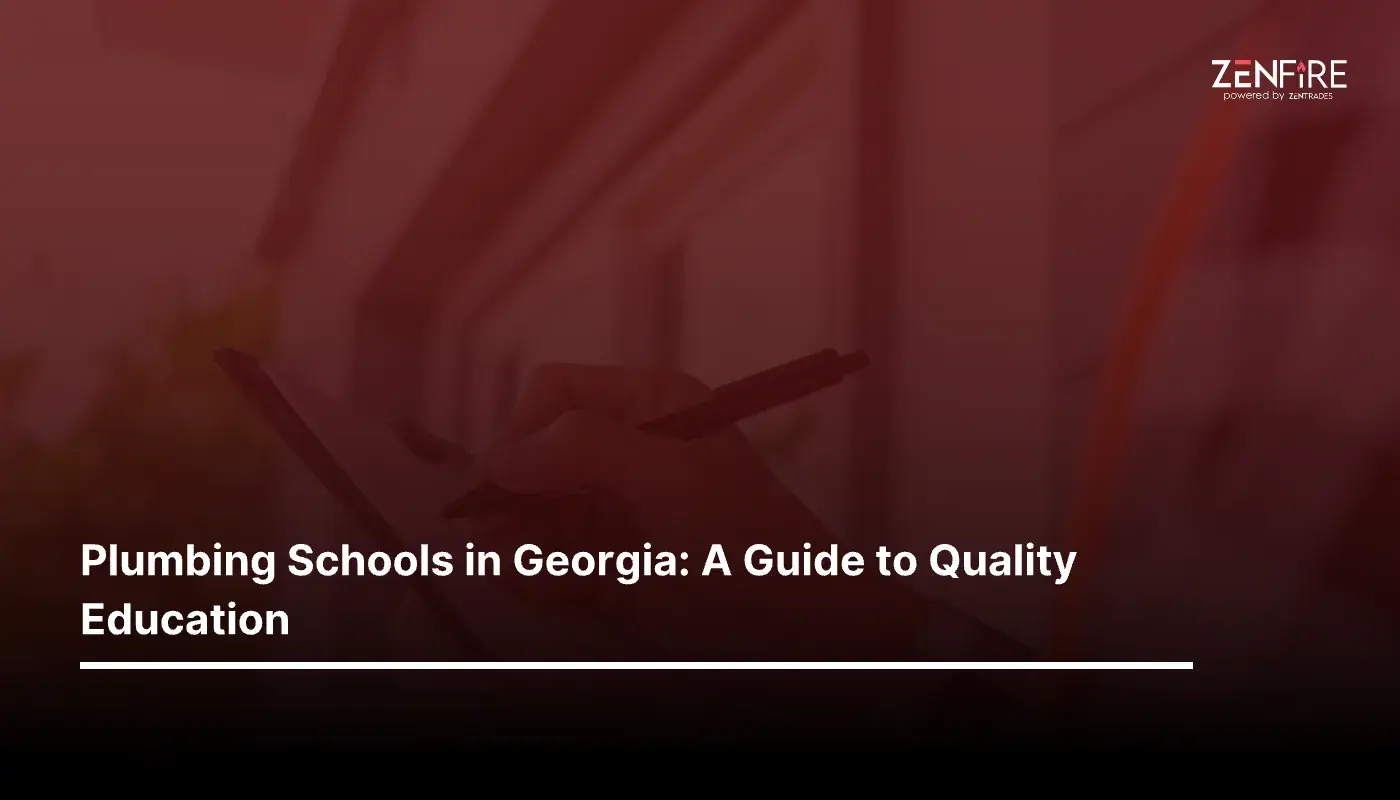Plumbing Schools in Georgia: A Guide to Quality Education
- ZenPlumbing
- 9 Min Read
The number of people joining this specialized employment has considerably increased, and the need for plumbers in Georgia has also increased significantly. The ‘Peach State’ requires fresh talent who is passionate about this line of work and has all you need to make diving into this career field doable and profitable!
According to Research and Markets, Georgia is one of the ten states comprising 61% of the overall U.S. construction market. Additionally, according to CareerOneStop, a website for job seekers maintained by the U.S. Department of Labor, the growth rate for pipelayers, plumbers, steamfitters, and their helpers in Georgia is expected to be 12% between 2020 and 2030, as opposed to 5% nationwide.
Precise data on employment boards supports this. On Indeed.com and Zip Recruiter, hundreds and thousands of plumber jobs are posted in Georgia—ready to be applied by passionate and skilled individuals looking to grow in this field.
So, how do you begin a career in this vital field? Find out by reading till the end of this blog.
We at ZenPlumbing have created a knowledge vault for plumbing contractors and technicians like yourself. Head to our website for more informative articles to enhance your business knowledge.
ZenPlumbing’s field service management software can also streamline and optimize your workflow to generate growth and more revenue for your business!
Book a FREE demo today to start streamlining your workflow!
Here What We Cover
Requirements For A Career In Plumbing
A trade school or apprenticeship is the first step in becoming a plumber. An apprentice plumber does not require any certification or authorization. In a trade school or as an apprentice, you can start accumulating the three years of work experience necessary to apply for your journeyman plumber license under the guidance of a licensed master plumber. After two years, you can use to become a master plumber.
To quickly grasp the practical differences between the two license levels in Georgia, think of a journeyman as a trainee and a master as the trainer. A journeyman is equipped to do the required plumbing work, but a master must train and employ them.
Due to their ability to develop their skills as plumbers, only master plumbers can bid on plumbing jobs. Thus, obtaining your master plumber license is a requirement if you want to run your own business.
Georgia recognizes the following three types of licenses:
1. Journeyman License: To be eligible for a journeyman license, applicants must provide proof of at least three years of direct or secondary experience.
Plumbing system installation under supervision would provide them the opportunity to earn direct experience. Secondary experience would be earned while participating in installation-related work or training, such as official educational programs. Up to two years of secondary experience may be substituted for by completing a technical school diploma program in engineering technology.
At a vocational-technical school, completing a certificate program can count as up to one year of secondary education.
2. Class 1 Master License Restricted: Applicants must provide proof of at least five years of relevant experience, at least two of which must have been spent as a certified journeyman plumber, licensed plumbing contractor, foreperson, superintendent, or military plumber.
Class I master plumber licenses are only permitted in single-family homes, homes that can accommodate no more than two families, and small commercial buildings under 10,000 square feet.
3. Class 2 Master’s License Unrestricted: Non-restricted applicants must provide proof of at least five years of relevant experience, at least two of which must have been spent as a licensed journeyman plumber, plumbing contractor, plumbing foreperson, plumbing superintendent, or military plumber. Non-restricted applicants must also provide details of any prior experience with commercial or industrial plumbing.

Use our free estimate template now
Make winning quotes in minutes—for any industry and any job.
Certification Available For Plumbers
Choose from various degree and certificate programs for plumbing education at the college level. The most significant variations between them are how long they take to finish and how much each one costs.
The most popular plumbing programs are:
- Three to six-month certificate program
- One to two-year diploma program
The cost will increase as the program runs longer. Many plumbers have some post-secondary education. However, very few people choose a four-year bachelor’s degree unless they’re looking for a relevant engineering or building construction degree. Consider Georgia Tech’s Bachelor of Science in Building Construction or Georgia Southern University’s Bachelor of Science in Construction if this is the direction you wish to take.
However, a four-year degree is optional to become a plumber or start your plumbing firm. In many circumstances, formal education pays dividends in the shape of greater compensation. A license to practice plumbing in Georgia does not require a legal degree. As a substitute, you must have at least three years of relevant experience and pass the licensure test to become a journeyman plumber.
All Georgia plumbers must complete continuing education every two years to stay current on plumbing technology and codes. This is the only type of education that is required of them.
How To Select The Ideal School For Your Education?
When choosing the college and program that is best for you, there are numerous factors to consider.
School Tuition
Naturally, the most important factor is cost. For in-state and out-of-state students, tuition at each school is quite standard: $100 per credit hour. It is important to check all associated costs because there will be some price variances between each school.
As you enter your chosen profession, you can keep the purchased instruments, which are always associated with additional charges. After submitting the Free Application for Federal Student Aid (FAFSA) form on fafsa.ed.gov, all students who wish to receive federal (Pell Grant) and state (Hope Funding) financial aid must do so.
Length of the Program
As previously mentioned, you can have a technical certificate or a more comprehensive diploma program. The certifications take one to two semesters to complete and range in credit hours from 12 to 21. A few courses that range from 30 to 40 credits each and need one additional semester are available. Four semesters, or nearly two years, is the normal length of the diploma programs.
Benefits
If you’re interested in becoming a plumber, formal schooling has many advantages. However, the field does not require formal education to begin working in Georgia, although many businesses will choose a candidate with qualifications over one without.
A foundational understanding makes gaining a foothold in a shop full of experts easier. Technical training is frequently associated with higher starting income and lifetime earnings.
Online versus in-person
People who live in more remote parts of Georgia or have obligations that make it difficult to drive to a school campus may opt to enroll in an online certificate program to obtain plumbing instruction. Only you can determine whether this kind of autonomous curriculum will be effective.
Online classes are appropriate for those looking for entry-level positions or entry-level employees looking to raise their pay. Ashworth College and Penn Foster offer the two most well-known online plumbing programs. They are listed at the top of the articles about the Best Online Courses for Plumbing on Bob Vila’s and the CPA Accounting Institute for Success websites.
Traditional in-person classes are often available across the state if you know your learning style benefits from individualized teaching.
Complication level
Whether the plumbing school is in Georgia, New York, or anywhere in the US, there is to train graduates for entry-level jobs in the commercial, industrial, or residential plumbing industries. The curriculum covers physics and mathematics.
To succeed, plumbers must learn a variety of skills, including how to install or repair plumbing systems according to blueprints or other design specifications, troubleshoot problems at residential or commercial properties, run all water, gas, and sewage lines during new installations, know when to use different pipe materials and how to fit them together correctly, understand plumbing code, and keep accurate records of all work done. The importance of client service is undeniable, particularly in residential jobs.
How To Enroll In Plumbing Schools?
Although each technical college has its unique procedures, the process generally starts with a visit to the school’s website and an online admissions application. You can also send a paper application to the school’s admission office or visit it in person. All entail submitting many documents and paying a $25 application fee.
The following steps are generally included in the application process:
- Submit your application in full.
- Submit your application fee.
- To be eligible for in-state tuition, present proof of residency.
- Request the delivery of sealed official high school transcripts or GED results.
- Provide placement test results.
- Apply for housing on campus, if necessary.
Get posts like this in your inbox.
Keep learning how to run a 5-star business with our bi-weekly newsletter.
Plumbing Schools in Georgia
In Georgia, most plumbing sector newcomers learn skills on the job. Although it is not legally necessary to start learning to do plumbing work or obtain a license in Georgia, formal education can assist you in finding employment.
If you decide to begin your plumbing education in Georgia, there are numerous training programs available, but only a few of them are recognized by a national body. A few plumbing programs provided by Georgia’s Technical College System have received approval from the National Center for Construction Education & Research.
However, you will notice NCCER certification on Construction Management and Welding and Joining Technology offerings more frequently throughout the state’s technical colleges.
Just a few Georgia Technical Colleges presently offer any plumbing coursework. Still, because of the demand, West Georgia Technical College’s Carroll campus will add at least one additional program in the upcoming academic year.
The following two technical institutions provide NCCER plumbing programs:
- Southern Crescent Technical College (Griffin and Flint River campuses)
- Albany Technical College
Georgia Plumber Salaries
Before investing in technical education and beginning a career in plumbing, you’ll want to have a general notion of the return on your time, effort, energy, and financial investment. In other words, how much money can you expect to make in Georgia as a plumber?
According to Payfactors.com. Georgia’s 2022 average plumber income is:
- $2-year entry-level salary: $45,200
- 2-4 years of intermediate: $52,500
- 4-6 years for seniors: $59,100
Conclusion
Although recognized programs are only one of your choices, and there are few plumbing programs in Georgia, accreditation might help you feel more confident in your technical college.
Alternatively, you might work for and learn from a certified plumber. As an apprentice or assistant to that plumber, you’ll pick up skills and eventually desire to get your license.
In conclusion, Georgia is where you can acquire the training you need to succeed as a plumber. There are opportunities everywhere you look!

Explore a better way to grow your business. Book a free demo now!
Get organized, win jobs, and wow customers.
Book A Free Demo with ZenTrades Today!
Related Reading


